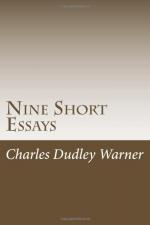Yes; we must insist that, under the circumstances, the American people have borne this outburst of English criticism in an admirable spirit. It was as unexpected as it was sudden. Now, for many years our international relations have been uncommonly smooth, oiled every few days by complimentary banquet speeches, and sweetened by abundance of magazine and newspaper “taffy.” Something too much of “taffy” we have thought was given us at times for, in getting bigger in various ways, we have grown more modest. Though our English admirers may not believe it, we see our own faults more clearly than we once did—thanks, partly, to the faithful castigations of our friends—and we sometimes find it difficult to conceal our blushes when we are over-praised. We fancied that we were going on, as an English writer on “Down-Easters” used to say, as “slick as ile,” when this miniature tempest suddenly burst out in a revival of the language and methods used in the redoubtable old English periodicals forty years ago. We were interested in seeing how exactly this sort of criticism that slew our literary fathers was revived now for the execution of their degenerate children. And yet it was not exactly the same. We used to call it “slang-whanging.” One form of it was a blank surprise at the pretensions of American authors, and a dismissal with the formula of previous ignorance of their existence. This is modified now by a modest expression of “discomfiture” on reading of American authors “whose very names, much less peculiarities, we never heard of before.” This is a tribunal from which there is no appeal. Not to have been heard of by an Englishman is next door to annihilation. It is at least discouraging to an author who may think he has gained some reputation over what is now conceded to be a considerable portion of the earth’s surface, to be cast into total obscurity by the negative damnation of English ignorance. There is to us something pathetic in this and in the surprise of the English critic, that there can be any standard of respectable achievement outside of a seven-miles radius turning on Charing Cross.




